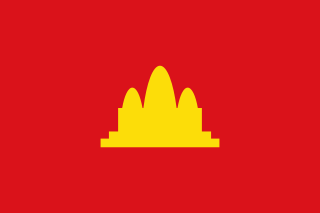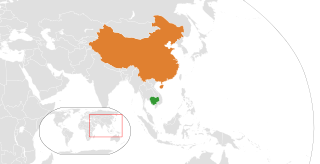Related Research Articles

Khmer is an Austroasiatic language spoken by the Khmer people and the official and national language of Cambodia. Khmer has been influenced considerably by Sanskrit and Pali especially in the royal and religious registers, through Hinduism and Buddhism, due to Old Khmer being the language of the historical empires of Chenla, Angkor.

The economy of Cambodia currently follows an open market system and has seen rapid economic progress in the last decade. Cambodia had a gross domestic product (GDP) of $28.54 billion in 2022. Per capita income, although rapidly increasing, is low compared with most neighboring countries. Cambodia's two largest industries are textiles and tourism, while agricultural activities remain the main source of income for many Cambodians living in rural areas. The service sector is heavily concentrated on trading activities and catering-related services. Recently, Cambodia has reported that oil and natural gas reserves have been found off-shore.

The Khmer Rouge is the name that was popularly given to members of the Communist Party of Kampuchea (CPK) and by extension to the regime through which the CPK ruled Cambodia between 1975 and 1979. The name was coined in the 1960s by then Chief of State Norodom Sihanouk to describe his country's heterogeneous, communist-led dissidents, with whom he allied after the 1970 Cambodian coup d'état.

Phnom Penh is the capital and most populous city of Cambodia. It has been the national capital since the French protectorate of Cambodia and has grown to become the nation's primate city and its economic, industrial, and cultural centre. Before Phnom Penh became capital city, Oudong was the capital of the country.

Cambodia, officially the Kingdom of Cambodia, is a country in Mainland Southeast Asia. It borders Thailand to the northwest, Laos to the north, Vietnam to the east, and has a coastline along the Gulf of Thailand on the southwest. It spans an area of 181,035 square kilometres, and has a population of about 17 million. Its capital and most populous city is Phnom Penh.

The Cambodian Civil War was a civil war in Cambodia fought between the forces of the Communist Party of Kampuchea against the government forces of the Kingdom of Cambodia and, after October 1970, the Khmer Republic, which had succeeded the kingdom.

Kratié, alternatively spelled Kracheh, is a province of Cambodia located in the northeast. It borders Stung Treng to the north, Mondulkiri to the east, Kampong Thom and Kampong Cham to the west, and Tboung Khmum, and the country of Vietnam to the south.

Pailin is a province in western Cambodia at the northern edge of the Cardamom Mountains near the border of Thailand. This province is surrounded by Battambang province, and was officially carved out of Battambang to become a separate administrative division after the surrender of the Ieng Sary faction of the Khmer Rouge in 1996. Pailin is known to much of the world for having long been a stronghold of the Khmer Rouge, remaining under their control long after they were defeated in 1979 and serving from 1994 to 1998 as the capital of the Provisional Government of National Union and National Salvation of Cambodia. Within Cambodia, Pailin is known for its natural resources, namely precious gems and timber.

Khmer numerals are the numerals used in the Khmer language. They have been in use since at least the early 7th century, with the earliest known use being on a stele dated to AD 604 found in Prasat Bayang, near Angkor Borei, Cambodia.

SEA Games, officially known as the South East Asian Games, is a biennial multi-sport event involving participants from the current 11 countries of Southeast Asia. The games are under the regulation of the Southeast Asian Games Federation with supervision by the International Olympic Committee (IOC) and the Olympic Council of Asia (OCA). The SEA Games is one of the five subregional Games of the Olympic Council of Asia (OCA).
Operation Freedom Deal was a military campaign led by the United States Seventh Air Force, taking place in Cambodia between 19 May 1970 and 15 August 1973. Part of the larger Vietnam War and the Cambodian Civil War, the goal of the operation was to provide air support and interdiction in the region. Launched by President Richard Nixon as a follow-up to the earlier ground invasion during the Cambodian Campaign, the initial targets of the operation were the base areas and border sanctuaries of the People's Army of Vietnam (PAVN) and the Viet Cong (VC).

Education in Cambodia is controlled by the state through the Ministry of Education in a national level and by the Department of Education at the provincial level. The Cambodian education system includes pre-school, primary, secondary education, higher education and non-formal education. The education system includes the development of sport, information technology education, research development and technical education. School enrollment has increased during the 2000s in Cambodia. USAID data shows that in 2011 primary enrollment reached 96% of the child population, lower secondary school 34% and upper secondary 21%.

Neak Loeung is a busy commercial town in Prey Veng Province, Cambodia. Located on the Mekong and astride National Highway number 1, it is the commune centre for Neak Leung commune and the capital of Peam Ror District. The town can be reached by car ferry from Kampong Phnum in Kandal Province or by boat along the Mekong river.

The bilateral relations between the Kingdom of Cambodia and the People's Republic of China have strengthened considerably after the end of the Cambodian–Vietnamese War, during which China had supported the Khmer Rouge against Vietnam.

The quality of health in Cambodia is rising along with its growing economy. The public health care system has a high priority from the Cambodian government and with international help and assistance, Cambodia has seen some major and continuous improvements in the health profile of its population since the 1980s, with a steadily rising life expectancy.
Schistosoma mekongi is a species of trematodes, also known as flukes. It is one of the five major schistosomes that account for all human infections, the other four being S. haematobium, S. mansoni, S. japonicum, and S. intercalatum. This trematode causes schistosomiasis in humans.
Prostitution in Cambodia is illegal, but prevalent. A 2008 Cambodian Law on Suppression of Human Trafficking and Sexual Exploitation has proven controversial, with international concerns regarding human rights abuses resulting from it, such as outlined in the 2010 Human Rights Watch report.

General elections were held in Cambodia between 23 and 28 May 1993. The result was a hung parliament with the FUNCINPEC Party being the largest party with 58 seats. Voter turnout was 89.56%. The elections were conducted by the United Nations Transitional Authority in Cambodia (UNTAC), which also maintained peacekeeping troops in Cambodia throughout the election and the period after it.

The Cambodian genocide was the systematic persecution and killing of Cambodian citizens by the Khmer Rouge under the leadership of Prime Minister of Democratic Kampuchea, Pol Pot. It resulted in the deaths of 1.5 to 2 million people from 1975 to 1979, nearly 25% of Cambodia's population in 1975.
Cambodia remains on the list of developing countries, despite recent economic growth. Although Cambodia is undergoing significant urbanization. Cambodia has made progress in combating poverty, and many citizens have risen just above the poverty line